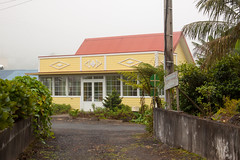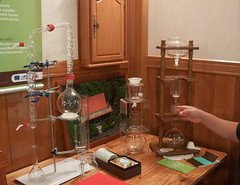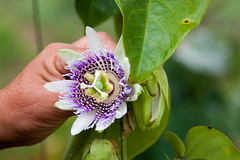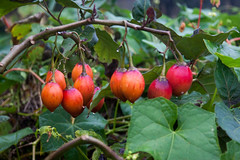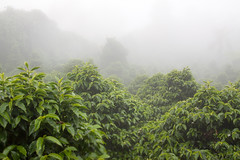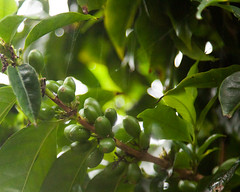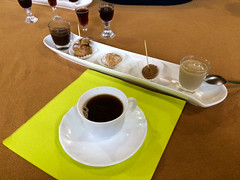(Update: From what I can tell, Maison du Laurina closed during the Covid-19 pandemic, at least to tours)
One of the pieces of advice we got from the few people I was able to talk to that had been to the island was to tour a coffee plantation. And I discovered that this was a bit harder to set up… most of the plantations are very small family farms, and you have to set up the reservation via phone, often with a member of the farmer’s family who speaks no English and doesn’t understand my French.
But it’s worth doing: the plantations all focus on a single variety of coffee: the Bourbon Pointu coffee bean. Bourbon Pointu was grown long ago on the island (back when it was Ile Bourbon), and was a highly-prized variety, and thought lost when the island shifted to a sugarcane economy.
But starting at the turn of the last century, an enterprising agricultural engineer discovered small plantings of the plant that had been maintained in a Japanese horticultural greenhouse, and was able to successfully reintroduce the plant to the island. The result is a small but growing industry of coffee producers on Reunion producing one of the world’s best-regarded, and most expensive, coffees.
So we set out one rainy day in search of La Maison du Laurina, a small coffee grower on Le Grand Coude on the Southeastern corner of the island (a very odd little plateau accessed via a single-lane road driving along a literal knife edge ridge), with whom we were eventually able to secure a reservation via email from the most hospital host, Mr. Jacques Lepinay.
The first part of the tour at La Maison du Laurina is the coffee brewing museum, which was a neat collection of everything from coffee urns to alembics to vacuum brewers. This was rather interesting, since our host spoke exactly zero English, and this was a severe challenge for my French, but between my knowledge of coffee and technical terms (like “alembic”), we did surprisingly well, with the exhibits ranging from old-style pots, percolators, filter presses, alembics, vacuum siphons, and even a vintage Mr Coffee.
The next part of the tour was touring the farm fields. I was expecting to be taken out to the coffee plants right away, but instead, we got a phenomenal tour of their entire farming operation, which involved cultivating quite a few of the local products on various terraces on the side of the hill, including several acres of chouchou (chayottes), passion fruit (with their awesome flowers), guava, palm, and even an unusual tomato variety common on the island: the “tomate arbuste” (“bush tomato”, also known as a Tamarillo in Spanish). We finally found the plant at their farm.
But the soon enough found ourselves in the actual coffee plantation, viewed through the misty rain, and our host showing us how the beans grow into little, tiny pointed berries, giving the variety its name.
Then they took us inside for a formal coffee service, both of several cups of the coffee itself, an entire array of pastries made with the Bourbon Pointu coffee, and even two different liqueurs made from the coffee as well.
How was the coffee? It was easily one of the best coffees I’ve ever had, and that includes Jamaican Blue Mountain. Rich, robust flavor, smooth and not very bitter, and a nice tanginess, this was a very nice coffee. I bought several 250g packets for 11 euros each, which made this “expensive”, but not crazy. (Getting back to Paris, I found several places serving it for 15 euros a cup, and you can find several places online selling the coffee for $250/lb!). Add in some rather nice pastries, some liqueurs (one of which got purchased and brought home with us), and a very pleasant hike through their farm, and I found this to be one of the more enjoyable parts of our visit, even if the weather was dismal. The owner, Jacques Lepinay, and his wife were wonderful hosts, especially since the language barrier was substantial (at one point, Jacques wandered off and came back with a French-English dictionary), and we had a great time… our 11 euro tour fee got us almost two hours of tours, coffee sampling, and a lot of pastries and coffees. I’d love to go back.

